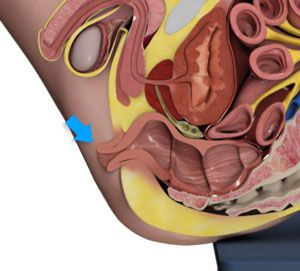
What is Rectal Prolapse?
Rectal prolapse is a condition in which the lowest part of the large intestine, known as the rectum, gets displaced from its natural position within the pelvic region and starts to drop down towards and through the anus.
There are three types of rectal prolapse:
- Internal prolapse: In this type of rectal prolapse, the rectum has only dropped slightly so that it hasn’t reached the anus.
- Partial prolapse: In this type of rectal prolapse, the rectum has partially protruded through the anus.
- Complete or full-thickness prolapse: This type is where the rectum completely protrudes through the anus.
Causes of Rectal Prolapse
The causes of rectal prolapse include:
- Chronic constipation or chronic diarrhoea
- Nerve damage that affects your rectal and anal muscles’ ability to tighten and loosen
- The long-term history of straining during bowel movements
- The weakening of the anal sphincter
- Old age, as most of the ligaments and muscles of the body, including those in the rectum gradually lose strength over time.
- Former injuries in the pelvic region or the near the anus.
Risk Factors for Rectal Prolapse
Women over age 50 are at the highest risk for developing rectal prolapse. Certain diseases, conditions, and infections may also indirectly increase the risk and may include chronic obstructive pulmonary disease (COPD), diabetes, hysterectomy, cystic fibrosis, and intestinal parasitic infections by pinworms or whipworms.
Symptoms of Rectal Prolapse
Symptoms of rectal prolapse include:
- Sensation of a bulge outside your anus
- Presence of a red mass on the outside your anal opening
- Pain in the rectum or anus
- Rectal bleeding
- Leakage of stool, blood or mucus from the anus
Diagnosis of Rectal Prolapse
To diagnose a rectal prolapse, your doctor will review your medical history, enquire about your symptoms, and conduct a physical examination.
Your doctor may order one or more of the following tests to confirm the diagnosis:
- Colonoscopy: In this test, a long, flexible tube with a camera called a colonoscope is inserted through the anus to examine the large intestine and rectum.
- Proctography: This test is used to obtain a kind of X-ray showing the anal canal and rectum during a bowel movement.
- Anal electromyography (EMG): This test is used to check for the coordination between the anal muscles and the rectum. The test also analyses the possibility of nerve damage causing the failure of the anal sphincter.
- Magnetic resonance imaging (MRI): This test is done in the radiology department and is sometimes used to evaluate the pelvic organs.
Treatments for Rectal Prolapse
If the rectal prolapse is very small, your doctor may recommend stool softeners so you can have bowel movements without straining and manually pushing the prolapsed tissue back in place with a gloved finger, but eventually, you will need surgery to correct the condition as it worsens over time. Generally, there are two types of surgery for treating the condition:
- Rectal repair: This method consists of surgical removal of the protruding part of the rectum or the inner lining of the rectum and stitching the excised end of the rectum back inside the anal canal. This surgery is generally reserved for older people or people suffering from various other medical problems.
- Through the abdomen: This type of surgery is performed by making an incision in the abdominal wall and repairing the rectal prolapse through the abdominal cavity. This can be done by laparoscopic or open surgery.
Prevention of Rectal Prolapse
Rectal prolapse can be prevented by:
- Eating plenty of fibre daily
- Drinking plenty of water daily
- Exercising regularly
- Avoiding excessive straining during a bowel movement






